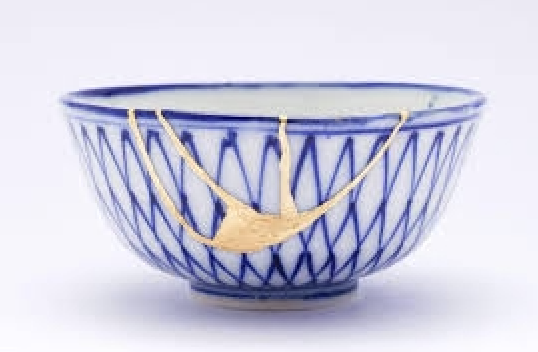 We’re all broken in one way or another. A broken bone here, a broken heart there. Maybe we know someone whose spirit is broken. Whether we’re chipped, cracked, or smashed to pieces, each one of us is flawed in some way, shape or form. Life is rarely lived in the perfect but, if we’re very fortunate, it can still be lived in recovery and repair.
We’re all broken in one way or another. A broken bone here, a broken heart there. Maybe we know someone whose spirit is broken. Whether we’re chipped, cracked, or smashed to pieces, each one of us is flawed in some way, shape or form. Life is rarely lived in the perfect but, if we’re very fortunate, it can still be lived in recovery and repair.
Kintsugi is the Japanese art of repairing broken pottery with lacquer that has been mixed with dusted gold. The areas of repair are not hidden or disguised. In fact, an object’s very brokenness is enhanced, emphasized and strengthened through the art of kintsugi. In kintsugi, what was damaged becomes illuminated, and both the damage and the repair become part of that object’s history. But kintsugi is more than just the artful repair of something broken. It is a manifestation of the philosophy that embraces the imperfect. In Japanese culture, an object that is broken, cracked or even shows the inevitable scars of age is venerated; its fault lines are the very proof of its true value, and therefore worthy of loving and artful restoration.
Kintsugi is also related to the Japanese philosophy of ‘mushin’ which encompasses the concepts of non-attachment, acceptance of change, and fate as inherent aspects of human life. It’s a sensitive, even poignant, way of looking at the world, one grounded in a deep and abiding understanding of how fragile life really is.
Sometimes, when I can’t sleep at night, I go over the imperfections in my own life, not to dwell on them, but to learn from them, to apply a little kintsugi to my own chips and cracks. I’d like to think that some artisan might come along to make me whole again, even enhance my own value, but maybe that artisan doesn’t exist. Or maybe I am that artisan.
I think about parents who have lost children. Children who have lost a parent. Siblings who have lost siblings. Lovers who have lost each other; friends who have lost friends. Those chips and cracks seem irreparable to me, but maybe I’m too attached; maybe I can’t see the beauty that comes with repair.
Here’s the thing: imperfection is all around us. It is in us. And yet, we continue to believe in perfection, that everything comes right in the end, that there is no brokenness. But stop for a minute. Ask the people in Ukraine. Ask the mother who loses her son to gun violence. Ask the family who has been evicted from their apartment because they can’t pay the rent this month, or the immigrant who has walked a thousand miles with a baby on her hip only to be turned away at the border. Where is the artisan who will repair their brokenness, the one who will fill the cracks in their lives with a lacquer mixed with gold dust and make everything whole again and, not only whole, but more beautiful than before?
In Japanese, the word ‘kinstsugi’ means ‘golden repair.’ I’d like to think that concept refers as much to people as it does to broken pottery. I don’t know about you, but my own chips and cracks need a little golden repair from time to time. Don’t get me wrong: my personal vicissitudes are bad enough, but given all that I’ve been through, I’m one of the lucky ones. I’m learning to accept my fragility, to be resilient, to take pride in my own imperfections and clumsy repairs.
Can you?
I’ll be right back.
Jamie Kirkpatrick is a writer and photographer who lives in Chestertown. His work has appeared in the Washington Post, the Baltimore Sun, the Philadelphia Inquirer, the Pittsburgh Post-Gazette, the Washington College Alumni Magazine, and American Cowboy Magazine. His new novel “This Salted Soil,” a new children’s book, “The Ballad of Poochie McVay,” and two collections of essays (“Musing Right Along” and “I’ll Be Right Back”), are available on Amazon. Jamie’s website is Musingjamie.net.



Bob Moores says
Valuable wisdom, Jamie. The only thing I could add is something I read a long time ago and have tried to practice, though it may not be easy or possible: A failure is an unrepaired mistake.